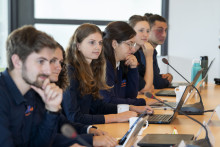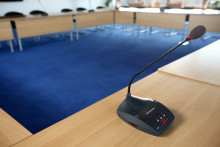U-Today
Free - in store
 News
NewsTwo student parties and one staff party submitted a list of candidates for the University Council elections, which will take place from 10 to 14 June. Students can once again choose between DAS and UReka, while only candidates on behalf of the Campus Coalition are eligible for staff members.
 News
NewsTwee studentenpartijen en één medewerkerspartij dienden een lijst in met kandidaten voor de universiteitsraadsverkiezingen, die van 10 tot 14 juni plaatsvinden. Studenten kunnen opnieuw kiezen tussen DAS en UReka, voor medewerkers staan enkel kandidaten namens Campus Coalitie verkiesbaar.
 News
NewsThe internationalization debate and language policy, the recent election results and the UT’s financial issues. These developments feel like a ‘perfect storm’ for Young Academy Twente members Caroline Fischer and Canan Acar. ‘People are angry at the system and are looking for scapegoats.’
 News
NewsHet internationaliseringsdebat, het taalbeleid, de recente verkiezingsuitslag én de financiële problemen van de UT. Die ontwikkelingen voelen voor Jonge Akademie Twente-leden Caroline Fischer en Canan Acar als een 'perfecte storm'. 'Mensen zijn boos op het systeem en zoeken zondebokken.'
 News
NewsFour candidates have applied for the two available seats on the University Council. They are Jacqueline Weppelman on behalf of 'List Weppelman' and PhD candidate Anton Atanasov on behalf of 'List P-NUT'. Campus Coalition brings forward Joyce Karreman and Emile Dopheide. Who are they and why do they want to be in the Council?
 News
NewsVier kandidaten hebben zich gemeld voor de twee beschikbare zetels in de universiteitsraad. Het gaat om Jacqueline Weppelman namens ‘List Weppelman’ en promovendus Anton Atanasov namens ‘List P-NUT’. De Campus Coalitie schuift Joyce Karreman en Emile Dopheide naar voren. Wie zijn ze en waarom willen ze in de Uraad?